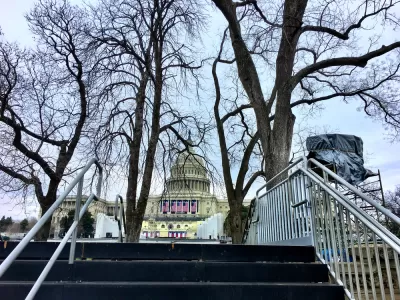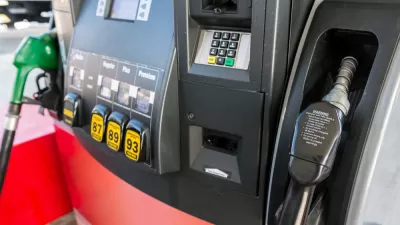The incoming chair of the House Transportation and Infrastructure Committee, Peter DeFazio (D-Ore.), points to gubernatorial races and a California ballot initiative to show there's no peril for legislators to hike the gas tax.

"Rep. Peter DeFazio, an Oregon Democrat expected to head the committee when his party takes over the House of Representatives in January, told MarketWatch that this month’s midterm elections showed raising [state] gasoline taxes isn’t a political third rail, and that it’s 'something we can work on' with President Donald Trump as Washington tries to fashion an infrastructure package," reports Robert Schroeder.
Infrastructure is back in the spotlight after the midterms, with Democrats, Trump and Republican leaders all expressing interest. But paying for improvements and new projects will be the “hangup,” according to incoming House Minority Leader Kevin McCarthy, a California Republican.
But this last election demonstrated there’s no “political peril” for lawmakers who would raise the gasoline tax if they show voters it will improve roads and bridges, [DeFazio] said in a lightly edited interview with MarketWatch about his ideas.
First question: How do you propose to pay for instructure investment?
DeFazio points to the "three bipartisan infrastructure proposals" listed on his "Investing in America" webpage, the first one being "A Penny For Progress (H.R. 1664)."
Rather than increasing the 18.4 cent federal gas tax and 24.4 cent diesel tax, unchanged since 1993 when it was increased by 4.3 cents per gallon, the bill takes an extremely modest approach by indexing the gas and diesel tax to highway construction costs and reduced fuel usage due to Corporate Average Fuel Economy (CAFE) standards, i.e., fuel efficiency standards. It hasn't moved since being introduced in March 2017, but it wasn't his first attempt at it either.
DeFazio introduced an earlier version of the bill in March 2013 where it also languished under the Obama administration that was not receptive to increasing the gas tax.
Second question: "To be clear, you believe the president would still be on board with some form of a gasoline tax?"
DeFazio expressed optimism that an agreement could be reached with the Trump administration.
The president, in my one meeting with him, advocated a substantial gas-tax increase, so I think this is still something we can work on, and we’re going to need the president, because there’s a reluctance on the part of some in the Senate.
However, it was DeFazio's analysis of how gas taxes fared in the midterms that was the most illuminating part of the interview.
In California, [incoming House] Minority Leader [Kevin] McCarthy used personal campaign funds to put on a ballot measure [Proposition 6] to repeal their gas tax and fee increase, and he got his head handed to him, in more ways than one, and it pretty well p’d off a lot of groups that are traditionally supporting Republicans — [the Associated General Contractors of America (AGC)] and others.
And then Tim Walz, my colleague, ran for governor of Minnesota and advocated a 10-cent gas increase. Next door, Michigan, a woman [Gov.-elect Gretchen Whitmer] — both red to blue states — advocated, she said, “Fix the damn roads.” [See: Minnesota Gubernatorial Candidate Campaigned on Increasing the Gas Tax and Wins].

Maui's Vacation Rental Debate Turns Ugly
Verbal attacks, misinformation campaigns and fistfights plague a high-stakes debate to convert thousands of vacation rentals into long-term housing.

Planetizen Federal Action Tracker
A weekly monitor of how Trump’s orders and actions are impacting planners and planning in America.

San Francisco Suspends Traffic Calming Amidst Record Deaths
Citing “a challenging fiscal landscape,” the city will cease the program on the heels of 42 traffic deaths, including 24 pedestrians.

Adaptive Reuse Will Create Housing in a Suburban Texas Strip Mall
A developer is reimagining a strip mall property as a mixed-use complex with housing and retail.

Study: Anti-Homelessness Laws Don’t Work
Research shows that punitive measures that criminalized unhoused people don’t help reduce homelessness.

In U.S., Urban Gondolas Face Uphill Battle
Cities in Latin America and Europe have embraced aerial transitways — AKA gondolas — as sustainable, convenient urban transport, especially in tricky geographies. American cities have yet to catch up.
Urban Design for Planners 1: Software Tools
This six-course series explores essential urban design concepts using open source software and equips planners with the tools they need to participate fully in the urban design process.
Planning for Universal Design
Learn the tools for implementing Universal Design in planning regulations.
Heyer Gruel & Associates PA
JM Goldson LLC
Custer County Colorado
City of Camden Redevelopment Agency
City of Astoria
Transportation Research & Education Center (TREC) at Portland State University
Jefferson Parish Government
Camden Redevelopment Agency
City of Claremont




























